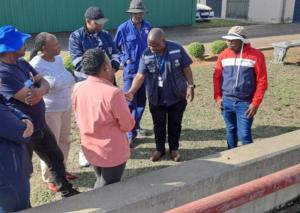Strengthening Environmental Surveillance to bolster polio detection and public health security for Lesotho
Maseru, - The Ministry of Health, with technical and financial support from the World Health Organization (WHO) Country Office and the WHO Regional Office for Africa (AFRO), conducted a comprehensive review and optimization of Environmental Surveillance (ES) sites across Lesotho. The mission was undertaken with the participation of a WHO AFRO-deployed expert, Dr. Daudi Manyanga, VPDs Surveillance Officer, who provided technical guidance throughout the assessment process. The review aimed to evaluate the functionality, performance, and quality of existing ES sites, enhance detection sensitivity for poliovirus, and strengthen the country’s overall public health surveillance system.
Environmental Surveillance is a vital component of the Global Polio Eradication Initiative (GPEI), complementing Acute Flaccid Paralysis (AFP) and laboratory surveillance. By analyzing sewage samples, ES provides critical data on the presence and circulation of polioviruses, including asymptomatic infections that may otherwise go undetected.
“Environmental surveillance plays a crucial role in our ability to detect and respond swiftly to poliovirus transmission,” said Ms. Sellonae Maepe, WHO Lesotho Expanded Programme for Immunization Officer. “By strengthening this system, Lesotho is reaffirming its commitment to health security and ensuring that our surveillance systems are not only effective for polio but also adaptable to detect other priority pathogens that pose risks to public health.”
The review exercise revealed that while Lesotho has maintained a functional environmental surveillance system, there are persistent gaps that require immediate attention to enhance the country’s capacity for early detection and response. Sub-optimal performance in routine immunization, AFP, and environmental surveillance was observed, calling for stronger integration of surveillance functions with immunization and outbreak preparedness activities.
The review further highlighted the importance of improving data quality and feedback mechanisms to facilitate evidence-based decision-making. It called for the establishment of an Environmental Surveillance Technical Working Group (TWG) to coordinate national efforts, oversee resource mobilization, and ensure that ES activities are sustainably integrated into the national surveillance budget. The TWG will also support the implementation of quarterly performance reviews and facilitate inter-sectoral collaboration to improve efficiency.
“The Ministry of Health remains committed to strengthening surveillance systems that safeguard the health and wellbeing of all Basotho,” added Ms. Motenalapi Malekhetho, National Surveillance Officer, Ministry of Health. “This exercise reinforces our collective resolve to detect, prevent, and respond to health threats early - ensuring that our public health systems remain strong, resilient, and responsive. We thank WHO for the continued technical and financial support.”
Additionally, as part of the review, physical site assessments were conducted at Ratjomose, Masowe, and the Agricultural College wastewater sampling points to evaluate site suitability, operational performance, and compliance with standard operating procedures. The assessments helped determine the consistency of flow, environmental conditions, and the feasibility of long-term sampling at each location. The findings also highlighted the need to expand surveillance coverage to additional strategic and high-risk areas such as Likotsi Filter Clinic and Qoaling Clinic, and to enhance sample collection timing during peak flow hours for quality representation of findings.
In addition, the assessment emphasized the importance of adhering to established SOPs, strengthening cold-chain logistics, and improving on-site data recording and reporting through the electronic data (e-Data) tool. On-the-job training and supportive supervision were also recommended to ensure continuous skill development among field teams.
“The review provided us with a clear picture of where we stand and what must be done to sustain high-quality surveillance,” said Ms. Motenalapi Malekhetho. “It is not enough to collect samples — we must ensure they are representative, timely, and processed under the right conditions so that every potential signal of poliovirus is captured and acted upon quickly.”
As part of the capacity-strengthening component, a refresher training was conducted for both old and newly assigned Environmental Surveillance staff. A total of 20 officials were trained, focusing on practical skills for sample collection, transportation, documentation, and biosafety. The session also reinforced understanding of surveillance indicators, standard operating procedures, and integration with the national health information system to improve data reporting and feedback.
Poliovirus-infected individuals can shed the virus in feces for several weeks, with particles remaining infectious in the environment depending on conditions such as temperature. ES therefore provides a unique opportunity to detect silent transmission and confirm the absence of the virus in the population.
As Lesotho continues to implement recommendations from this review, the Ministry of Health and WHO reaffirm their shared commitment to ensuring that no child is left at risk of vaccine-preventable diseases, and that the country remains proactive in the fight against polio and other public health threats.
